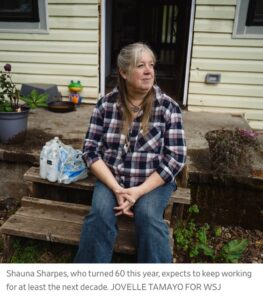From Corporate Working to Corporate Living
“Not me, brother! I will continue to work until at least 70, and maybe 75 (if my health holds)!”
Yep! Having fought my way into middle management, that is exactly what I said when I was only 55 years old, and that was more than fifteen years ago! There was no doubt about my progressive ability to sustain myself within the working environment, yet I retired in 2017 at age 65.
The fact is, according to the PEW RESEARCH FOUNDATION article dated December 14, 2023:
“Roughly one-in-five Americans ages 65 and older (19%) were employed in 2023 – nearly double the share of those who were working 35 years ago.”
Working into later years is, 1) neccessary for the most part, and, 2) a law, as the government keeps raising the retirement age limit. As the article indicates, older workers are paid well and most enjoy their jobs, and in the second part of the article, The Growth of the Older Workforce, PEW begins by saying,
“Numbering roughly 11 million today, the older workforce has nearly quadrupled in size since the mid-1980s. The increase is driven in part by the growth of the 65-and-older population. The bulk of the Baby Boom generation has now reached that threshold.”
So, yes, I was among that group. What happened, you asked! Did my health fail, bad back, serious illness, debilitating injury? No…none of the above. The industry changed. Technology surpassed me, and the younger generation overtook me. It was as simple as that; they aged me out of the business.
In a recent article in the Wall Street Journal, I found the story of Jovelle Tamayo, who lives in Washington State (see image), where she currently resides with her fiance in a house they are renovating. Like so many of us who approach those years of maturing skill levels and changing times, for her, life changed rapidly. Ergo, we become the tail trying to wag the dog. For Jovelle, her intended life-long employment closed its doors, and she found it nigh on impossible to find other employment. For others, well, there are too many reasons to list. The simple fact is that time overtakes us, leaving us with few options.
In their WSJ article, America’s 60-Year-Olds Are Staring at Financial Peril, of July 22, 2024, at 9:00 pm ET, authors Jon Kamp, Scott Calvert, and Paul Overberg speak extensively of how “financially exposed” so many of us baby-boomers have become.
By the end of this year, the youngest baby boomers will all turn 60. The birth dates of those in this generation—around 70 million strong, or one in five Americans—cover a 19-year span stretching from the aftermath of World War II to 1964, … More of these young boomers “are going to enter into retirement without the resources they need,” said David John, who studies retirement savings issues at the AARP Public Policy Institute.
Whether it be rumor or not, we hear the threat that some government officials want to do away with Social Security altogether, which only lends to the anxiety of what future retirement will mean. To help thwart that likelihood, the government keeps pushing out the legal retirement age. Yes, you can still retire early, but the government will penalize you by keeping a large portion of the money that YOU invested with it. If you wish to reach maximum benefits, you’ll “keep on keepin on,” as the old saying goes—in other words, an apparent act of legal extortion, i.e., work until you absolutely need it. (I say that only because of how our government will give hundreds of billions of dollars to foreign governments and immigrants while allowing its senior population to live, in many cases, in poverty or near there too.)
None (or at least most of us do not) want to “become a burden to our children,” but with today’s medical and eldercare costs continually rising, it is becoming nigh on impossible not to ask for help somewhere, if not from them. Then again, many do not have children or another family to turn to. Consequently, many have to try in some way to push on, i.e., work until they drop or seek alternatives.
So, then, how do we cope with it? What do we do about it? What resources are available to us? To whom do we turn if we cannot afford to do it on our own?
For Jovelle, she found a partner to marry, and together, they hoped to make it through. For each of us, the struggle will be the same but different. We all have widely and wildly varied circumstances, and there is no easy answer for anyone.
One of the primary factors affecting our (seniors) ability to live comfortably is the fact that large corporations are taking over the Senior Living Facilities, including 55+ communities like ours. Constantly pushing up-up-up the cost of senior living—so high that, should we ever need to move into an assisted living environment, it will take EVERY PENNY of our income, and more, and leave us at the mercy of those who run the facilities, as many currently do.
Although we are still very independent and living in a 55+ modular home community, Aberdeen was recently purchased by North Western Mutual Properties and uses a company called Murex Property Management as rent controllers—one whose new and tentative “PROSPECTUS” drastically reduced amenities while increasing homeowner responsibilities.
On top of all that are the apartment complexes, businesses, medical offices, schools, etc., that are steadily encroaching on the area we live in, and I fear that we will, one day soon, be forced to move without recouping any of the money invested in our current homes so that the current corporation can sell the land for commercial use, leaving us with nothing by what we can load into a truck.
So, from our perspective, it appears that my wife and I left our corporately owned cubicles at work, to retire into a corporately controlled property where our rent has increased, on average, 5% per year since we’ve lived here. Whereas other similar properties have increased as much as 8% annually, we see this to be nothing more than a way for them to keep the corporate earnings at a level satisfying to stockholders while putting that “dignified retirement” we all hope for a bit further out of reach.
It is not only the 55+ and other senior facilities that are in danger, however. The featured image in this article is from a Fortune Magazine article entitled, “For-profit groups have vacuumed up over 70% of America’s nursing homes, and health advocates are worried: ‘The care gets really bad’” written by Harris Meyer and KFF Health News, March 12, 2024. One excerpt from the article points out that:
“Consumer advocates, researchers, and regulators are leery about this trend. They point to studies showing that nursing homes owned by for-profit companies — particularly investors in private equity and real estate — tend to have skimpier staffing, lower quality ratings, and more regulatory violations. Motivated by these concerns, the Biden administration issued a rule last fall that requires nursing homes to disclose more information about their owners and management firms.”
(See Part 2 for more information.)
Share This Story:
Leave A Comment
You must be logged in to post a comment.
Related Articles
News & Information, Other Writing, Polit_Tics













James Eichenlaub says: